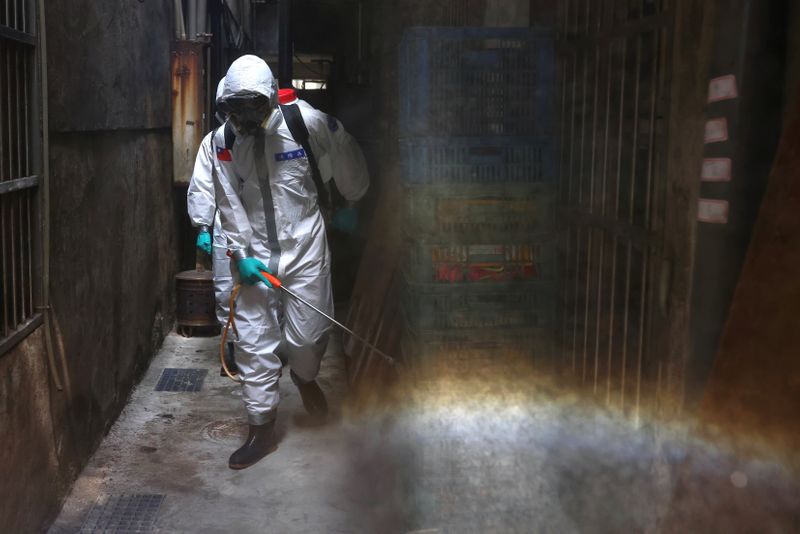Factbox-How COVID-19 in Southeast Asia is threatening global supply

© Reuters. FILE PHOTO: Soldiers in protective suits disinfect a street following the recent surge of coronavirus disease (COVID-19) infections, in the Tucheng district of New Taipei City, Taiwan May 27, 2021. REUTERS/Ann Wang/File Photo
SINGAPORE (Reuters) – Fresh coronavirus outbreaks in Southeast Asia have hurt factory activity across industries, threatening the region’s recovery from the COVID-19 pandemic and disrupting global supplies of goods such as apparels, automobiles, and electronics.
Coronavirus curbs have led companies to shut factories and suspend or reduce operations at a time when Asia’s manufacturing sector is already grappling with rising raw material costs and signs of a slowing Chinese economy.
Vietnam, Malaysia and Thailand are three of the region’s major manufacturing hubs and produce goods for some of the world’s largest consumer brands.
VIETNAM
A coronavirus wave since April forced Vietnam’s largest cities and industrial hubs to impose strict lockdowns, prompting electronics, apparel and footwear manufacturers to suspend or reduce operations. The restrictions have been eased in recent weeks.
The outbreak initially hit northern industrial areas, where suppliers for Apple (NASDAQ:), Samsung (KS:) and other global tech firms are located.
In May, the northern province of Bac Giang ordered four industrial parks, including three that house production facilities of Taiwan’s Foxconn, to temporarily shut down.
The outbreak spread further south and, in July, Ho Chi Minh City and neighbouring industrial provinces imposed strict lockdown measures.
That month, Taiwan’s Pou Chen Corp, which makes footwear for Nike (NYSE:) and Adidas (OTC:), suspended operations at its plant in Ho Chi Minh City and Changshin Vietnam, a South Korean firm manufacturing shoes for Nike, shut three of its factories.
Nike has cut its fiscal 2022 sales expectations and warned of holiday delays. Buyers of Apple’s new iPhone 13 are facing longer-than-expected delivery times because of the outbreak in Vietnam, where components for the device’s new camera module are assembled.
The Vietnam Textile and Apparel Association said several international fashion brands have shifted their orders away from Vietnam and 60% of apparel and footwear makers in the country have been fined for slow deliveries.
MALAYSIA
Several automakers and semiconductor companies have said in recent months that pandemic-related disruptions in Malaysia were hitting supply chains.
Malaysia imposed a lockdown in June as infections hit record levels but has gradually eased restrictions on manufacturing since July.
Curbs in Malaysia, which supplies about 67% of the global rubber glove market, also forced many glove makers to suspend operations in June and July.
Malaysia is home to factories serving semiconductor makers such as Europe’s STMicroelectronics and Infineon (OTC:), as well as major carmakers including Toyota Motor (NYSE:) Corp and Ford Motor (NYSE:) Co.
STMicroelectronics…
Read More: Factbox-How COVID-19 in Southeast Asia is threatening global supply
